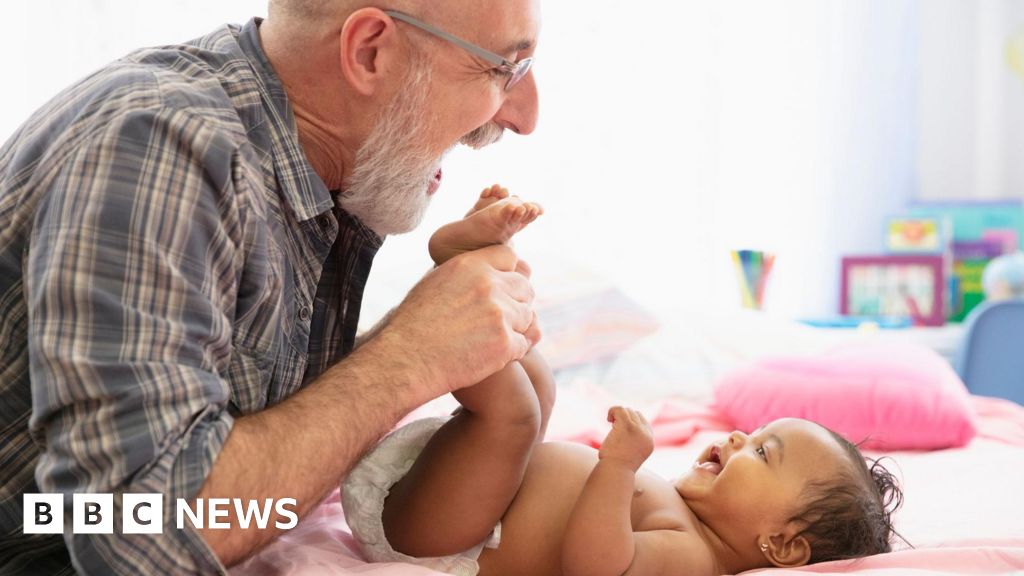Babies born to fathers over the age of 60 went up by 14.2% in 2024 compared to the year before,official figures show. Of 594,677 live births in England and Wales last year, 1,076 babies had dads over 60, according to the Office for National Statistics (ONS). Total births in England in 2024 rose slightly for the first time since 2021. Births where one or both parents were born outside of the UK also increased in both England and Wales. The ONS said the increase in the number of babies born to older dads was "notable". Professor Allan Pacey, an expert in male fertility, said research shows men over the age of 40 are "about half as fertile" as men aged 25, making the rise even more interesting. The number of babies born to parents younger than 30 decreased last year, following the pattern of peoplewaiting longer to start a family. Bucking theglobal trend for declining birth rates, the ONS reported a slight lift in the number of births in England. In 2024, there were 567,708 live births in England, an increase of 0.7% compared to the year before. However in Wales there were 26,832 live births - a decrease of 2% compared with 2023. Greg Ceely, head of population health monitoring at the Office for National Statistics, said the overall number of births in England and Wales "reverses the recent trend" of declining births. "Despite this overall rise, the number of births to mothers under 30 fell, as people continue to put off having children until later in life. "The largest decrease is seen amongst those under 20 years old, which fell by almost 5%," he added. A number of celebrities have welcomed children later in life.Rod Stewart was 65when his youngest was born.Robert De Niro was 79when his 6th child was born and in October last yearAl Pacino told the BBCit was "fun" being a new dad in his 80s. The UK government has recently been looking at ways toreduce child poverty. Rapidly increasing costs of living areoften citedas a barrier to having children. The government has alsolaunched a reviewof parental leave after acknowledging that one in three dads do not take paternity leave because they cannot afford to. Angela McConville, chief executive at childbirth charity NCT, said: "If government is serious about supporting people to have babies, they must create the right conditions for families to thrive. "That means access to safe, personalised maternity and postnatal care for everyone, as well as affordable childcare and action on the cost of living." Last month Health Secretary Wes Streetingannounceda national investigation into maternity care in England after a series of failings. The ONS figures also show an increase in the number of births to parents born outside of the UK in 2024. The percentage of live births where either one or both parents were born outside of the UK was 40.4% in England (up from 38.2% in 2023), and 19.4% in Wales (up from 17.5% in 2023). India remains the most frequent country of birth for non-UK born mothers and fathers for the third year in a row. When it comes to the timing of babies' births, Boxing Day (26 December) was the least likely birthday for babies born last year - for the twelfth year in a row. The most common day for babies to be born was 23 February. The most popular day for arrivals was a Tuesday, with Saturdays and Sundays the least likely day for a baby's birth.
'Notable' rise in dads over 60 in England and Wales
TruthLens AI Suggested Headline:
"Increase in Births to Fathers Over 60 Noted in England and Wales"
TruthLens AI Summary
In 2024, there was a significant increase in the number of babies born to fathers over the age of 60 in England and Wales, with a reported rise of 14.2% compared to the previous year. According to the Office for National Statistics (ONS), out of a total of 594,677 live births, 1,076 were to fathers in this age group. This increase comes alongside a slight overall rise in total births in England, marking the first uptick since 2021, although births in Wales saw a decrease. The ONS noted that while the total number of births in England rose by 0.7% to 567,708, the number of births to parents under 30 continued to decline, reflecting a broader trend of individuals delaying starting families. The largest drop was observed among those under 20 years old, which decreased by almost 5%. This demographic shift has raised questions about fertility, particularly as Professor Allan Pacey pointed out that men over 40 are significantly less fertile than younger counterparts, highlighting the complexities of fatherhood at an older age.
The increase in older fathers is part of a broader trend observed in the UK, where the percentage of live births to parents born outside the UK has also risen. In England, 40.4% of live births involved at least one non-UK born parent, up from 38.2% in 2023, while in Wales, this figure rose to 19.4%. The government is currently exploring ways to address child poverty, which is often cited as a barrier to family growth. Health Secretary Wes Streeting has announced a national investigation into maternity care following several reported failings. Additionally, Angela McConville from the childbirth charity NCT emphasized the need for improved support for families, including access to quality maternity care and affordable childcare. The trend of delayed parenthood is also reflected in the celebrity sphere, with figures like Rod Stewart and Robert De Niro becoming fathers later in life. Meanwhile, the ONS data revealed that Boxing Day remains the least common birthday for births, while February 23 was identified as the most popular day for newborns in the past year.
TruthLens AI Analysis
You need to be a member to generate the AI analysis for this article.
Log In to Generate AnalysisNot a member yet? Register for free.
